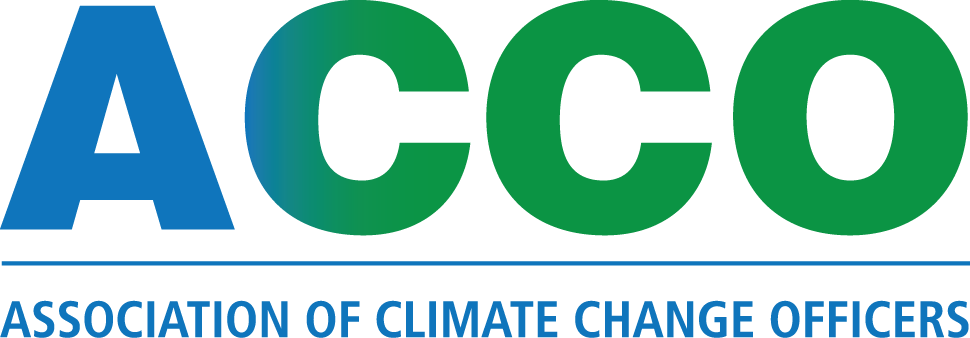About the 4 CC-P® Exam Modules (v. 1)
| Exam Payment & Registration Process: |
|
ACCO has simplified the process for you to earn the Certified Climate Change Professional® (CC-P®) credential. With 4 exam modules, you can plan and map your progress toward becoming a Certified Climate Change Professional® (CC-P®) today!
Climate Science & Vulnerability Assessment
GHG, Energy & Water Management
Governance, Law & Policy
Materiality, Risk Management & Economics
Showcase yourself as a climate smart professional with the capacity to develop and implement climate action plans.
Exam Topics & Recommended Prep Materials
You are not required to take any courses in advance of these exams, though ACCO has listed recommended prep materials for each exam module. The following information provides a short description, focal points and recommended prep materials for each exam module. Exams must be completed within one year of the date in which participant’s final CC-P® application is submitted (i.e. exams that fall outside the one-year window will be deemed expired and must be retaken).
Assesses your understanding of climate science and the capacity to conduct vulnerability assessments and inform organizational or regional decision making with critical resources.
Distinguishing between weather, climate variability, and climate change
Recent decadal-scale changes in climate and their impacts
Climate forcings, their relative importance and certainty
Sea-level rise and implications for coastal communities
Climate change projections, major impacts and corresponding certainty
Scientific studies on public opinion
Identifying climate-related hazards
Leveraging available data, tools, and technology to perform a vulnerability assessment
Designing and implementing a vulnerability assessment
Recommended prep materials:
Climate-101, Climate-103 & Climate-201
Estimated prep time:
6-7 hours
Exam time limit:
40 minutes
Examines your grasp of greenhouse gas (GHG) accounting, related reporting, and the role of GHG and natural resource management in an organization's operations.
Value of conducting a GHG inventory
Accounting for GHG emissions and understanding common protocols
Common regulatory and voluntary reporting frameworks
Boundaries for accounting and reporting
Collecting, measuring, reporting and disclosing GHG emissions
Driving operational improvements/change
Inventory verification and accuracy
Energy-water-food system interdependencies
Implications of climate change on natural resources
Understanding the methods available for developing targets
Structures of GHG reduction goals (absolute vs. intensity, etc.)
Recommended prep materials:
GHG-101, GHG-102 & GHG-201
Estimated prep time:
6-7 hours
Exam time limit:
45 minutes
Tests your comprehension of fundamentals of organizational change and stakeholder engagement best practices, as well as the current international and North American climate policy landscapes.
Fundamentals of organizational and behavioral change strategies and tactics
Identifying strategic internal and external stakeholders
Understanding motivations/values and mobilizing action
Understanding organizational structures and processes
Establishing a framework for driving systemic change in climate action
Fostering a culture of adaptive capacity within an organization
Awareness of international, national and local legal/policy landscape on climate change
Understanding of common policy measures and regulatory tools
Recommended prep materials:
Governance-101, Governance-102 & Governance-103
Estimated prep time:
6-7 hours
Exam time limit:
40 minutes
Evaluates your understanding of materiality considerations and capacity to implement climate risk management practices. Additionally, gauges your awareness of the economic implications of climate change and ability to account for opportunities and risks.
Categorizing and analyzing climate change related impacts
Materiality and the value of the materiality assessment process
Fundamentals of economic theories and concepts and climate change impacts on global economies and markets
Quantifying climate related implications
Accounting for the economics and future prices of energy, water, air, and other natural resources
Cost/benefit analysis of climate action (or inaction)
Collecting and integrating information from a variety of sources
Leveraging tools, methods and techniques for mapping vulnerabilities and quantifying climate change impacts
Recommended prep materials:
Climate-201, Enterprise-201 & Economics-101
Estimated prep time:
7-8 hours
Exam time limit:
40 minutes

